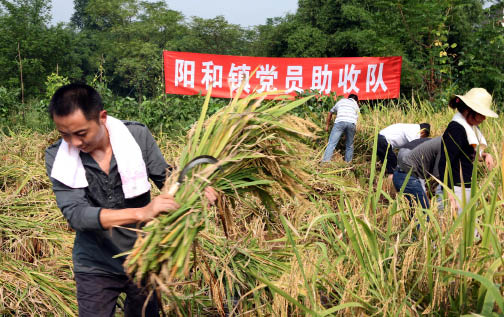| Branch Secretaries, More Than Political Leaders
By staff reporter ZHU HONG
 |
|
A team of CPC member volunteers helps needy farmers harvest rice over a weekend in August, 2010. |
IN the greenhouses of Chenjiadian Village, Helong Town, Nong'an County, Jilin Province, mushrooms sprout, cucumbers dangle, and celery thrives in the sunshine. The village runs its vegetable business through a cooperative, and Dai Guofeng is its Party secretary. "We have built our own brand in the market, and the demand for our products has surged beyond our supply," he says proudly. The village has 80 greenhouses, each of which makes annual profit of between RMB 60,000 and 70,000.
"Ever since I took office, I've never stopped thinking about how to stimulate the collective economy of our village and how to help the villagers increase their incomes," he says. Chenjiadian Village has established Party branches in its collective companies and cooperatives, and Party members play a leading role in these economic entities.
According to the CPC Constitution, a Party branch, the most basic unit of the CPC organization, must be established in a social, economic or academic establishment, such as enterprises, government organs, schools, institutions and rural and urban communities, where the number of Party members is three or above. At the end of 2009 the number of CPC primary-level organizations was approaching four million.
The secretary is the helmsman of a Party branch and also a very important player in the management of the establishment that hosts the branch. It is his or her duty to work on behalf of the people and lead them to improve their overall living conditions.
Showing the Way to Wealth
On June 4, 2010, Liu Jie was unanimously elected Party branch secretary in Longtou Village of Jilin Province. Liu, 46, had amassed his experience and knowledge in many undertakings, including grocery shops, deer farming, and working away from home for several years. This, plus his unfailing willingness to help others, has brought him great local support. Before joining the Communist Party in 2006, Liu used his own money to repair the roads and dredge out the reservoir in the village.
Soon after his election, Liu Jie set about getting wells dug, water pipes laid and cement roads built, resulting in huge improvements in Longtou's environment and in the villagers' lives. As he puts it, "The village is a big family and the villagers are my kin."
It is Jia Dongliang's opinion that, "A branch secretary should not just look out for his own economic interests, but help the people get wealthy." She is the Party branch secretary of Bayi Farm, Nanjie Town in Guangning County, Guangdong Province.
After being demobilized from the army in 1998, Jia chose to take up farming in a mountainous area of Guangning County, where he established the Bayi Farm.
In 2005, a Party branch was formed at the farm and Jia Dongliang was elected secretary. Under Jia's leadership every branch member established regular contact with three to five households in the neighborhood, providing them assistance with finances, farming technology and information service.
Mo Qiyong, a tangerine farmer, is one beneficiary of such help. He runs an orchard of two hectares, but at one point the annual yield was low – around 30,000 kilograms – owing to inadequate agro-technology. With the tutoring of Party members from Bayi Farm, Mo's orange groves doubled production last year.
The program of the Party branch at Jia's farm significantly boosted sweet tangerine production in Guangning County. The plantation area has expanded from under 2,000 hectares in 1998 to 14,600 hectares today, including 3,000-plus hectares in the town where the farm is located.
|
